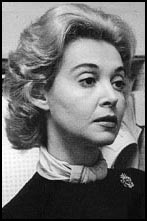Meet the woman journalist behind early US-Cuba talks

After 54 years of frozen relations, this month the U.S. and Cuba will fully normalize diplomatic ties for the first time, a historic move to be symbolized by the official reopening of both embassies on July 20. It’s a monumental change for the two countries. On May 29 Cuba was officially removed from the U.S. government list of countries guilty of “state-sponsored terrorism.” (Syria, Sudan, and Iran remain on the list.)
But as we recall the groundbreaking meeting between President Obama and Cuban President Raul Castro last April as a focal point for these sweeping changes, it’s also appropriate to remember that one of the earliest groundbreakers in U.S.-Cuban diplomacy was a pioneering journalist named Lisa Howard, the first woman host of a daily television news broadcast, who was also determined to play a role in restoring normal relations between the two countries.
A successful actress, Howard broke into journalism in 1960, first in radio, where she aired the U.S.’s first major interview with Soviet Premier Nikita Khrushchev. By the following year, she had her own daily news show on ABC television—Purex Presents Lisa Howard and the News With the Woman's Touch.
“She was one of the pioneers of bringing about what’s happening now,” said Peter Kornbluh, a senior analyst at the National Security Archive in Washington, DC, an investigative research center that works to expand public access to government information and manages a huge archive of declassified documents. Kornbluh, who also directs the Archives’ Cuba Documentation Project, first wrote about secret negotiations between emissaries for Presidents John F. Kennedy and Fidel Castro for Cigar Aficionado, an exposé that was later adopted into a feature documentary film for the Discovery/Times Channel called Kennedy and Castro: The Secret History.
In his article, Kornbluh tells how in April of 1963, Howard was able to secure an exclusive interview with Fidel Castro for an ABC special. In both the interview and in private conversation with Howard, Castro made his interest in restoring diplomatic relations clear; these statements sparked a chain of secret communications between the two nations, instigated by Howard.
Perhaps the most stunning event to come about in the aftermath of these secret maneuverings was a meeting between William Attwood, a deputy to United Nations Ambassador Adlai Stevenson, and Cuban UN Ambassador Carlos Lechuga, which took place at Howard's Manhattan apartment on September 23, 1963 under the guise of a party.
“She used her Upper East Side apartment as a place for secret communications,” says Kornbluh, “and with great chutzpah engineered the first meeting between Cuba’s ambassador to the UN and the American ambassador to the UN in a gesture of cocktail diplomacy. That was the first conversation. You could date the secret talks back to September of 1963.”
In fact, Howard’s home was used as a base for ongoing secret communications, according to Kornbluh, until the day the President was shot in Dallas just two months later.
“Lisa Howard was not only this pioneer in journalism,” said Kornbluh, but also “with great tenacity and courage, she used her extraordinary access to these figures to try to bring the U.S. and Cuba together, carrying back messages from Castro to the Kennedy White House. She was a woman ahead of her time.”
But ultimately, it was her political maneuverings and outspokenness that led to her downfall as a credible broadcast journalist.
Howard returned to Cuba in February of 1964 for another ABC interview with Castro, but the new president, Lyndon Johnson, was less amenable to normalizing relations with Cuba than his predecessor had been. And yet, Howard persisted with her negotiations.
In fact, among the documents uncovered by Kornbluh is a July 7, 1964 memorandum in which Gordon Chase, assistant to national security advisor McGeorge Bundy, reports his concerns that Howard's role as an intermediary had now escalated and that administration officials should try to “remove [her] from direct participation in the business of passing messages.”
“Howard wasn’t voicing these views on her news hour,” said Kornbluh, “but she had a life outside of her job, and part of it was political activism. She was quite opinionated, quite forceful.”
In the fall of 1964, Howard openly campaigned against Robert Kennedy’s campaign for U.S. Senator from New York. ABC warned her that her partisan politics would lead to dismissal. Howard continued anyway. “So they fired her,” says Kornbluh, “and cancelled her show.”
Depressed by the loss of her career and a subsequent miscarriage in 1965, Howard committed suicide during a 4th of July vacation in the Hamptons with her family by overdosing on barbiturates. The National Security Archive has documented her role in secret diplomacy with Cuba in a new book, Back Channel to Cuba.



























